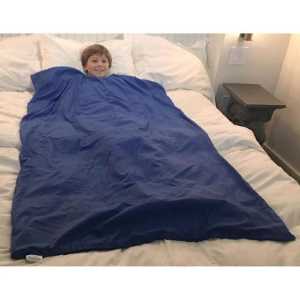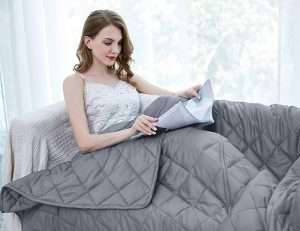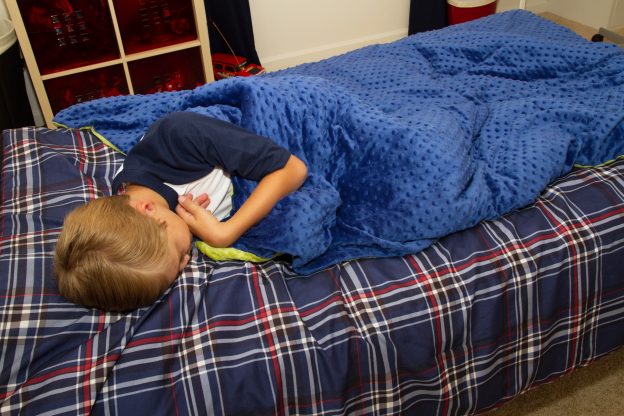Sleep experts recommend infused weighted blankets for adults as well as toddlers that find it difficult to get an uninterrupted night of sleep. Often the poor sleep and fatigue are attributed to the mattress or the pillow. What is rarely blamed is the blanket. Today it is believed that having a proper blanket is vital for good sleep. Unfortunately, not all blankets are equal when it comes to good sleep. For those who have poor sleep, extreme fatigue and feel lethargic in the morning, experts in sleep recommend weighted blankets, also known as the gravity blanket. Over the years, many anecdotal reports have appeared attesting to the health benefits of weighted blankets.
Related Reading: Weighted Blankets for Toddlers
What exactly are weighted blankets?
Weighted blankets or gravity blankets haven been around for decades and have been used by therapists to soothe children with a variety of disorders including autism, ADHD, nightmares, anxiety and stress. Now there is some evidence that weighted blankets may also be of benefit for adults. Weighted blankets are slightly heavier than the conventional bed covering. These blankets may have extra layers of fabric, silicone or some type of filler material like breathable cotton, seeds, beads, rice or other particles to make the blanket heavy. Some blankets may have a weighted feeling in certain pockets so that only specific areas of the blanket come into contact with the human body.

image credits: crm-a.org
How does the weighted blanket work?
The weighted blankets produce pressure over certain areas of the body, similar to what one feels during acupressure therapy. The increased pressure is spread over the body and gradually relaxes the muscle, just like what happens during massage therapy. During sleep, as the individual tuns ad moves, the weighted blanket applies pressure to different areas of the body, resulting in a soothing sensation. Some studies indicate that the pressure generated at specific points in the body results in the release of neurotransmitter (eg serotonin, melatonin) which then modulate the sensory perception of pain, stress, and anxiety; the overall result being a state of total body relaxation. Another interesting thing is that weighted blankets work with any sleeping position.
How heavy is a weighted blanket?

image credits: thesleepjudge.com
There are many types and sizes of weighted blankets but therapists suggest that the weighted blanket should take into account the weight and size of the person. The weighted blanket should be about 7-10% of the person’s body weight but the maximum weight should not be more than 25 pounds.
Who should not use weighted blankets?
Weighted blankets are not recommended for children younger than 2 years and infants. There is a risk of sudden death infant syndrome if the blanket is used in infants.
Related Reading: 6 Tips to Wake up Peacefully in the Mornings
What medical conditions can be helped by the weighted blanket?
Weighted blankets have been shown to help with a number of medical conditions including:
- Insomnia
- Stress
- Muscle and joint pains
- ADHD
- Anxiety
- Depression
- Restless leg syndrome
Conclusion on Weighted Blanket Benefits
It is important to note that the benefits of a weighted blanket are not a one-shot deal. To derive the health benefits, the weighted blanket has to be used regularly during sleep. Most people start to see the benefits within a few days. While the weighted blankets are slightly more expensive than the conventional blanket, they are safe, provide a warm hugging-feeling and permit a natural way to combat certain illnesses. And more importantly, unlike prescription medications, the weighted blanket does not cause serious adverse effects, addiction or tolerance


Great for kids (and sometimes adults) with sensory processing disorders, weighted blankets work by using deep touch pressure, which occupational therapists call a type of tactile sensation (a.k.a. something you feel on your skin). But the average person can also benefit from a weighted blanket on their bed here’s how.